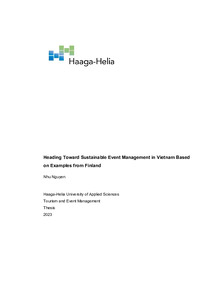Heading Toward Sustainable Event Management in Vietnam Based on Examples from Finland
Nguyen, Nhu (2023)
Julkaisun pysyvä osoite on
https://urn.fi/URN:NBN:fi:amk-2023060116849
https://urn.fi/URN:NBN:fi:amk-2023060116849
Tiivistelmä
In recent years, the event industry has experienced tremendous growth but has also left significant carbon footprints behind. To mitigate negative environmental, social, and economic impacts while still delivering an exceptional experience for the attendees, sustainable event management has emerged as an important consideration for event organizers worldwide. This study aimed to explore the challenges and opportunities for sustainable event management practices in Vietnam by examining insights from literature, leading events in Finland, and the experiences of Vietnamese professionals.
The theoretical section covered components such as the definition of sustainability, different events impacts, and the emerging sustainable event management concept. The study employed qualitative research method to investigate the cultural and societal differences between the two countries, and their influence on the adoption and implementation of sustainable event management practices in Vietnam. Primary research data was collected through semi-structured interviews. Secondary data was mainly synthesized from academic literature, open publications, and industry reports.
The findings revealed that the event industry in Vietnam prioritizes spectacle and budget over sustainability, with limited awareness of responsible practices, inadequate infrastructures, and regulatory support systems. In contrast, Finnish events prioritize meaningful content and minimalism, with a strong focus on environmentally friendly practices, supported by good public transportation, sufficient responsible partners and suppliers, digital tools, and waste classification systems. The study suggested a series of sustainable applications and practical examples which are easy to apply, suitable for the local context, and provide potential economic benefits. It is strongly recommended that event organizers in Vietnam adopt a long-term approach, engage in continuous communication, and invest in education to promote sustainable practices and shift the cultural preference for grandeur events.
The theoretical section covered components such as the definition of sustainability, different events impacts, and the emerging sustainable event management concept. The study employed qualitative research method to investigate the cultural and societal differences between the two countries, and their influence on the adoption and implementation of sustainable event management practices in Vietnam. Primary research data was collected through semi-structured interviews. Secondary data was mainly synthesized from academic literature, open publications, and industry reports.
The findings revealed that the event industry in Vietnam prioritizes spectacle and budget over sustainability, with limited awareness of responsible practices, inadequate infrastructures, and regulatory support systems. In contrast, Finnish events prioritize meaningful content and minimalism, with a strong focus on environmentally friendly practices, supported by good public transportation, sufficient responsible partners and suppliers, digital tools, and waste classification systems. The study suggested a series of sustainable applications and practical examples which are easy to apply, suitable for the local context, and provide potential economic benefits. It is strongly recommended that event organizers in Vietnam adopt a long-term approach, engage in continuous communication, and invest in education to promote sustainable practices and shift the cultural preference for grandeur events.
